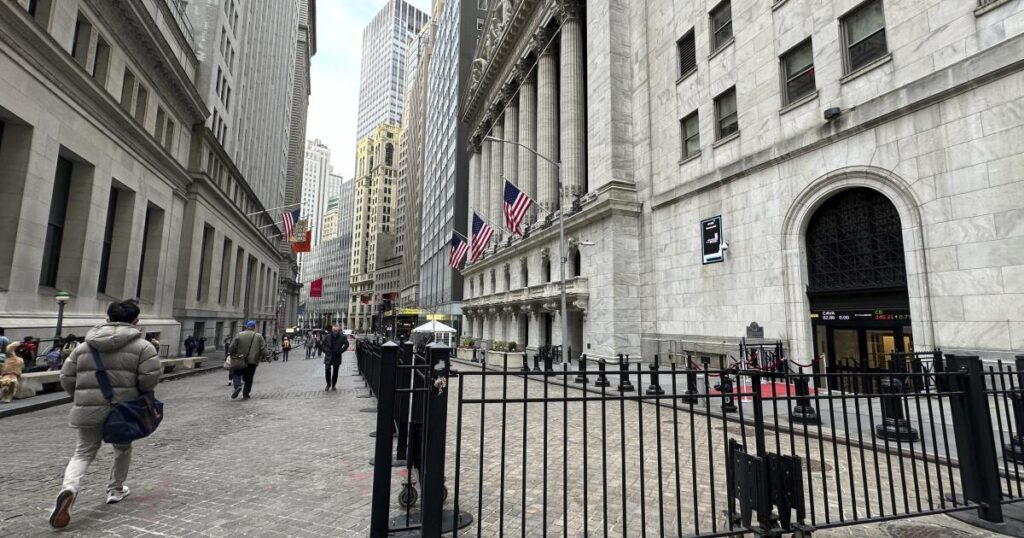Wall Street crossed the finish line of another losing week on Friday, the worst week for big tech stocks since the 2020 coronavirus crash.
The Standard & Poor's 500 Index fell 0.9%, ending its third straight week of declines. This is the longest run since September, before falling into a record-setting frenzy this year.
The Nasdaq Composite fell 2%. The Dow Jones Industrial Average, which is less heavily focused on tech stocks, was an outlier, rising 0.6%.
The market's worst-performing stocks included some of the biggest stars of the past. Super microcomputers fell 23.1%. The company, which sells servers and storage systems used in AI and other computing, had soared nearly 227% in the year to date.
Nvidia, another stock that soared to dizzying heights amid Wall Street's frenzy over artificial intelligence technology, also gave up some of its recent big gains. Due to its sheer size, it fell 10%, making it the heaviest single weight in the S&P 500 ever.
Tech stocks in the S&P 500 collectively fell 7.3% this week, their worst performance since March 2020, as some of the world's biggest companies reported disappointing trends. For example, Dutch company ASML, a major supplier to the semiconductor industry, reported lower than expected orders for early 2024.
The bigger threat was a gloomy realization on Wall Street that interest rates could remain high for an extended period of time.
Fed officials said this week that they may keep interest rates high for some time. This was a disappointment for traders after the Fed had earlier indicated it could cut interest rates three times this year.
High interest rates cause the prices of all types of investments to fall. The hardest hit tends to be those seen as the most expensive, which could make tech stocks vulnerable as investors wait the longest for big growth.
A cut in interest rates had long appeared imminent after inflation cooled sharply last year. But a series of reports this year showing that inflation has remained higher than expected has raised concerns that progress could stall.
Fed officials have insisted they want more confirmation that inflation is falling toward their 2% target before lowering the central bank's key interest rate, which is at its highest level since 2001.
Most traders now expect only one or two rate cuts this year, according to data from CME Group, down from forecasts of more than six rate cuts at the start of the year. They are also betting on the possibility of no cuts this year.
But Brian Jacobsen, chief economist at Annex Wealth Management, expects inflation to moderate as U.S. households, which have become “sensitive to price hikes” by companies, begin to rein in spending. .
“The huge (flight) of optimism from the market is due to the Fed's lack of foresight and its irrational focus on where inflation has been, rather than what it will be.” Stated.
With interest rates unlikely to be very helpful in the short term, companies are under additional pressure to deliver profit growth. The recent decline in the stock price has softened some of the criticism that the stock was too expensive, but the stock doesn't look cheap unless the stock falls further or profits soar.
Netflix fell 9.1% despite reporting better-than-expected profits in its latest quarter. Although analysts called the results mostly solid, the streaming giant disappointed some investors by announcing it would stop providing subscriber count updates every three months starting next year.
Helping to limit market losses was American Express, which rose 6.2%. The company reported that its latest quarterly profit was better than analysts expected. Fifth Third Bancorp similarly beat market expectations, rising 5.9%.
Overall, the S&P 500 fell 43.89 points to 4,967.23. This is 5.5% lower than the record set late last month.
The Dow rose 211.02 points to 37,986.40 and the Nasdaq fell 319.49 points to 15,282.01.
In the oil market, one barrel of Brent crude oil briefly exceeded $90 overnight due to concerns about fighting in the Middle East, before returning to $87.29. Iran's military fired air defenses at key air bases and nuclear facilities in response to drone attacks believed to be carried out by Israel, sparking concerns in the market. But oil prices pared their gains as traders wondered how Iran would respond.
In the bond market, the 10-year Treasury yield fell to 4.62% from 4.64% late Thursday, paring gains this week. Stocks fell further overnight at a time when concerns were growing about the possibility of war escalating in the Middle East.
Overseas, stocks were also mixed in Europe, after falling more sharply in Asia.
Cho writes for The Associated Press. Associated Press writers Matt Ott and Zimo Zhong contributed to this report.


